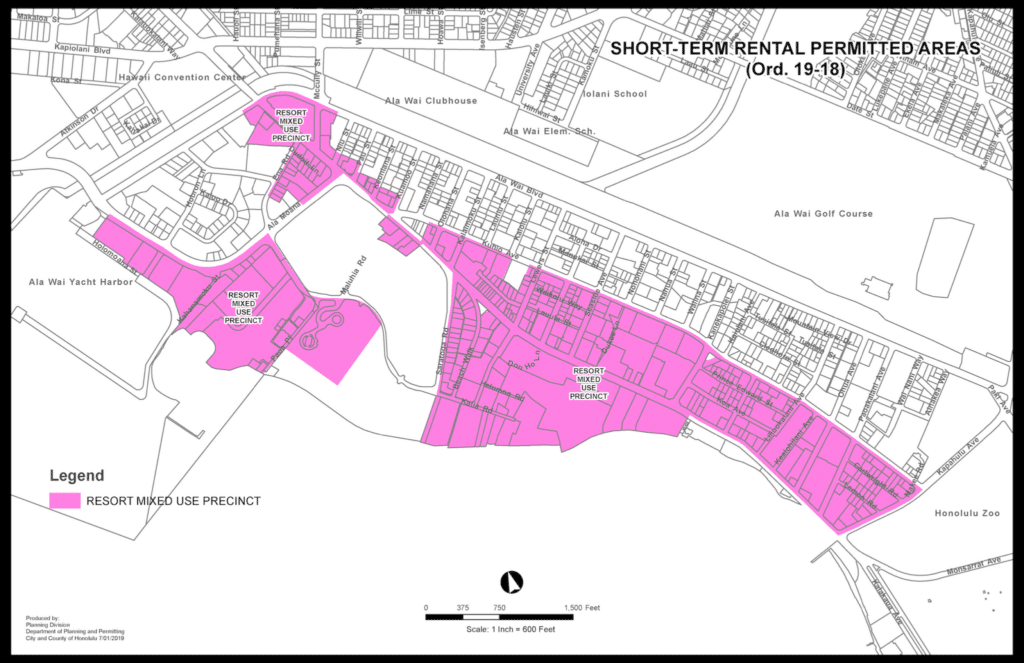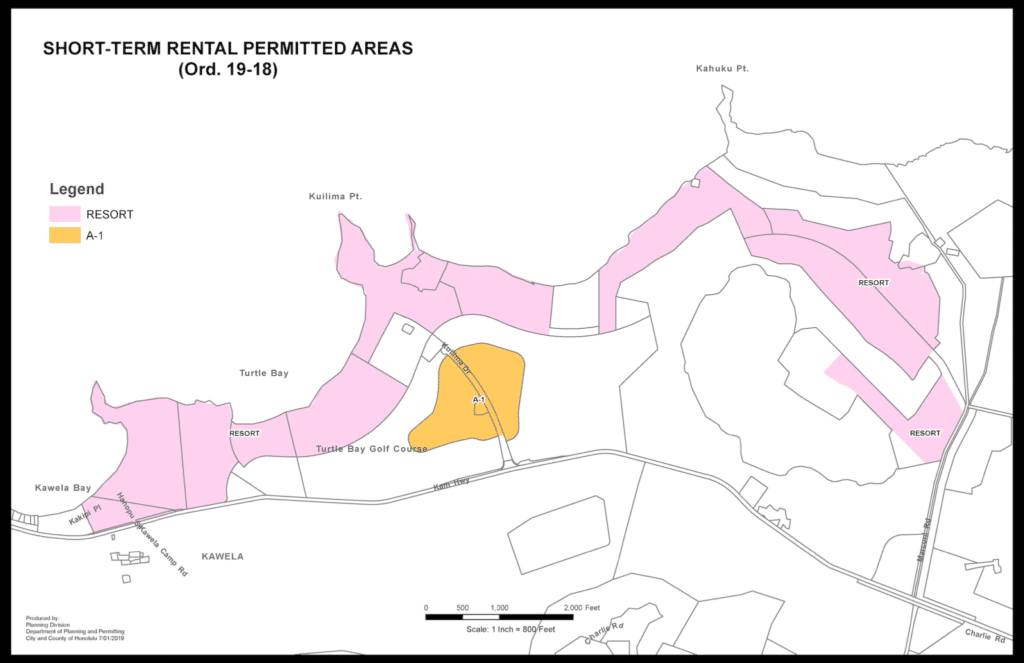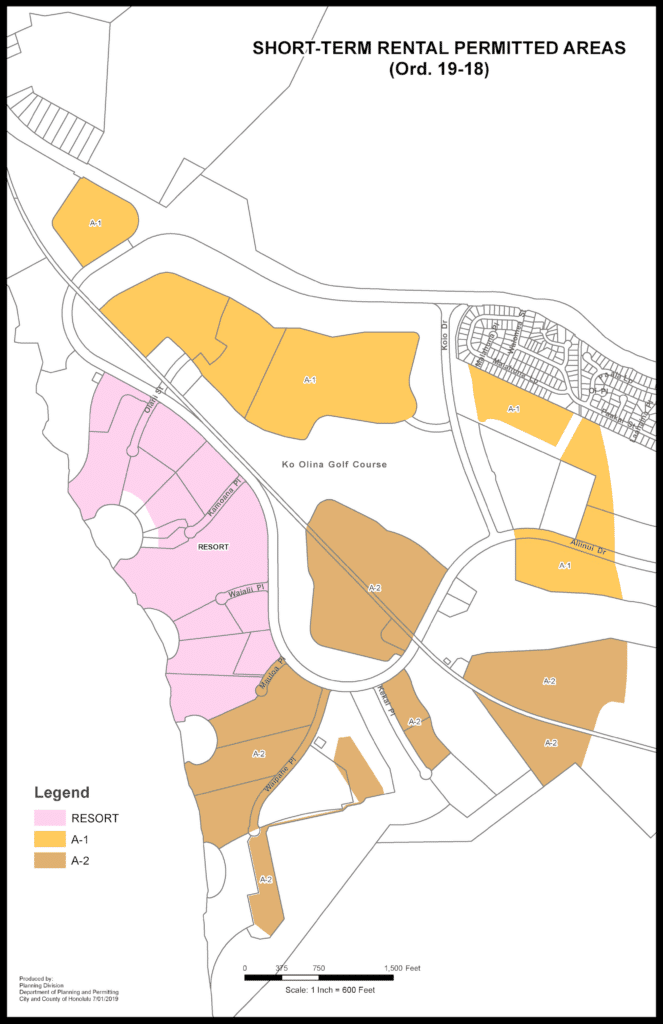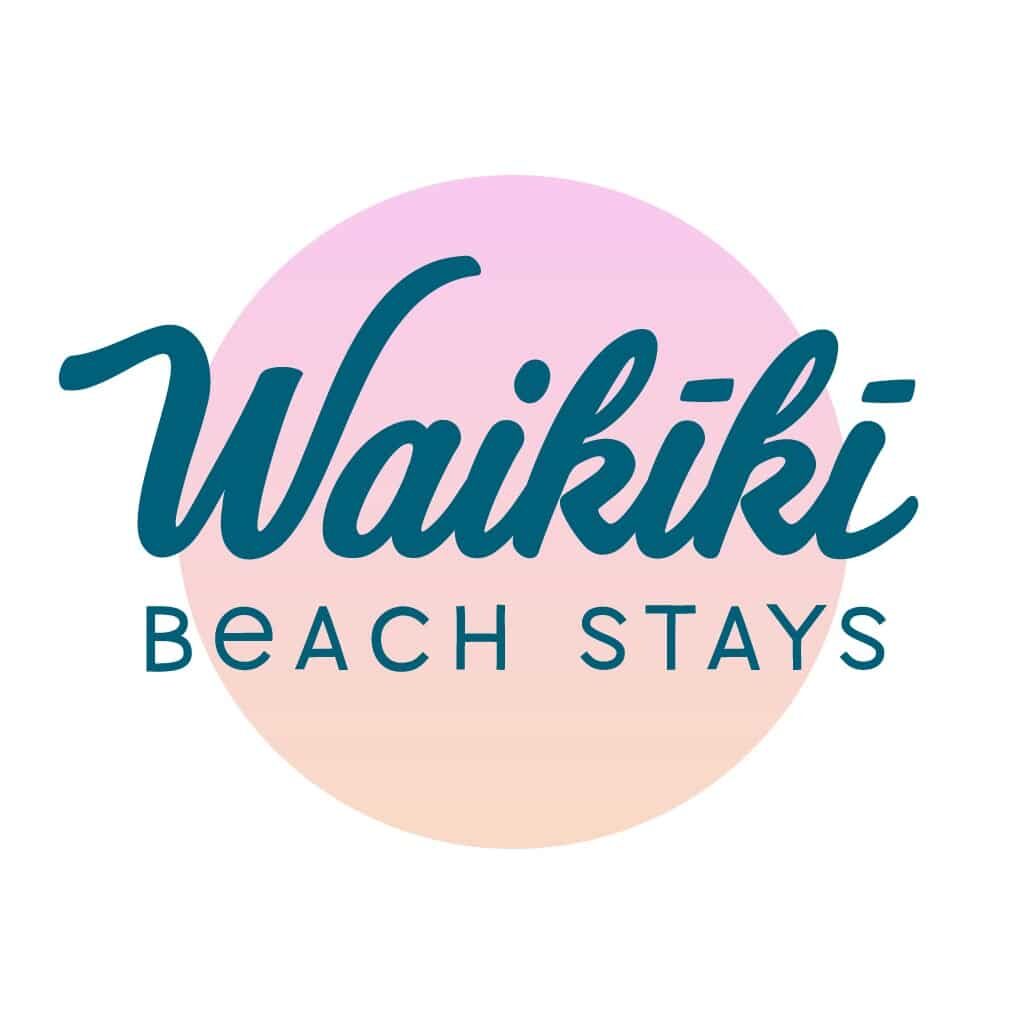The short answer is yes, vacation rentals are legal on Oʻahu, Hawaiʻi – as long as they meet a specific set of criteria. There is a lot of misinformation and confusion around the legality of vacation rentals in Waikīkī, Honolulu and Oʻahu, so let’s set the record straight.
Noting that the State of Hawaii has four counties and each one has its own regulations regarding vacation rentals, this article will focus on the rules governing the island of Oahu, set forth by the City & County of Honolulu.
We’ll get into the nitty-gritty detail below, but in summary, Ordinance 19-18 (Bill 89) clarifies where less-than 30-day vacation rentals are allowed. It does not ban short-term rentals on Oahu, and there are still plenty of Oahu vacation rental properties available to book including our Waikiki properties. To be legal, a short-term rental must be located on land that is zoned explicitly for ‘resort/resort mixed use’ or have a permit (called a NUC) to operate outside of these areas.
Note, vacation rentals with a lease term over 30-days are legal for Oahu properties unless the Homeowner’s Association (HOA) states otherwise. If you’re able to visit Oahu for at least 30-days your options for legal short-term rentals open up a great deal, especially on the North Shore and in Kailua. It’s perfectly fine to book a 30-day vacation rental, even if you plan to occupy the premises for less than that time. Either way, the owner can only have one tenant per 30-day period.
Vacation Rental Terminology
- Vacation Rentals are short-term rentals (STRs). They are usually privately-owned. Owners can manage their own properties or employ a property management company.
- STRs are residential dwellings, homes, or apartments (condominiums), that are advertised or rented for less than than 30 consecutive days. There are two types of short-term rentals; B&Bs and TVUs.
- B&Bs (bed & breakfast homes) are vacation rentals with the owner residing in the same dwelling. The law caps the number of B&Bs allowed in any given area.
- TVUs (transient vacation units) are vacation rentals without the owner residing in the same dwelling, they’re allowed only in resort zones unless they have a NUC.
- NUC (non-conforming use certificate), a permit acquired prior to 1990 that grants residential dwellings permission to operate as a short-term rental of less than 30 consecutive days, even though it may be outside of a resort zone. There are 800+ NCUs still in use on Oahu, a mix of B&B and TVU permits.
- Resort Zones are ‘resort/resort mixed use’ districts intended primarily to serve the visitor population, providing areas for visitor-oriented destination centers on Oahu.
Short History of Oahu Vacation Rentals
Oahu has always had districts that stipulate the type of business that can operate in each area. Only resort zones allow for short-term rentals (STRs), and there are only a few of these districts on the island (predominantly in Waikiki, Ko Olina, and Turtle Bay). Over the last few decades, the City & County of Honolulu has rarely enforced these regulations. In addition, no consideration has been given towards re-zoning, even though Oahu has experienced significant growth.
Prior to 1990, if you wanted to operate STRs outside of a resort zone you could apply for a non-conforming use certificate (NUC) permit. They stopped issuing NUCs in 1990 and since then, there has been no process to gain permission for vacation rentals in non-resort zones. According to the official NUC list, there are 800+ NCUs still in use on Oahu. Renting a NUC property is the only way to legally short-term rent on Oahu outside of a resort zone.
Like most destinations, Hawaii saw an increase in vacation rentals thanks to hosting platforms like Airbnb. These sites, combined with the two factors above, led to a proliferation of illegal Oahu vacation rentals. Many municipalities around the world have passed laws to control vacation rentals, and the City & County of Honolulu finally joined in August 2019.
Ordinance 19-18 (Bill 89)
Oahu’s vacation rental landscape changed on Oahu in August 2019 when the City & County of Honolulu passed Ordinance 19-18 (Bill 89). According to the City & County of Honolulu website, this bill ‘seeks to balance the benefits of short-term rentals (STRs) for hosts and guests with the desire to keep residential neighborhoods from being overrun by STRs’.
The law continued to prohibit transient vacation units (TVUs) or ‘whole home’ STRs outside of ‘resort/resort mixed use’ districts unless permitted by a non-conforming use certificate (NUC).
It also made it illegal to advertise STRs that do not comply with the zoning regulations provided by Ordinance 19-18. Prior to this, it was illegal to operate STRs that did not comply with the zoning regulations. Now just advertising one is against the law. This was the biggest shift in the industry because it made enforcing fines (of up to $10,000) a much easier process.
On a positive note, the ordinance allows for a limited number of new permits for bed & breakfast homes (B&Bs) in non-resort zones under a new registration process due to begin April 2021.
Where Are Vacation Rentals Allowed on Oahu?
Vacation rentals are allowed in ‘resort/resort mixed use’ districts on Oahu. These areas are specifically zoned by Ordinance 19-18 (Bill 89) to permit short-term rentals (STRs). Properties in a resort zone do not need a non-conforming use certificate (NUC) permit to be legal. If a property has a NUC, meaning it’s on the NUC list, it’s permitted to operate as a vacation rental even outside of a resort zone.
Oahu Resort Zones
Waikiki Resort Zone

Waikiki is by far the largest resort zone on the island of Oahu (highlighted above). It’s dominated by 80+ hotels and resorts, along with vacation rentals and time-share properties. You’ll notice that the designated ‘resort/resort mixed use’ precinct spans from the beachfront to Kuhio Avenue. To be fully compliant, buildings located in the resort zone must also have HOA (Homeowner’s Association) rules that do not prohibit short-term rentals.
Note, many buildings outside of the resort zone, between Kuhio Avenue and the Ala Wai Canal, are zoned Resort Hotel. This means the entire building is an approved operation and is exempt from requiring owners to hold a valid non-conforming use certificate (NUC). These legal buildings often feature vacation rentals and they may (or may not) have hotel operations within them.
For more information on what buildings in Waikiki allow short-term rentals, check out this Hawaii Living article, in particular, the section “The Ultimate List Of Legal Waikiki Condotels”.
Or better yet, just stay with us! Waikiki Beach Stays is a portfolio of three remodeled apartments in Waikiki, ready to rent for your next Hawaii holiday or remote work experience.
- 1 // Oh-So-Close to Waikiki Beach Condo – 2-night minimum stay
- 2 // Simply Beautiful Waikiki Apartment – 30-night minimum stay
- 3 // Waikiki Beach Loft Near Restaurants – 2-night minimum stay
Turtle Bay Resort Zone

Turtle Bay is a beautiful area on Oahu’s North Shore, about a 75-minute drive from Waikiki. The resort zone (highlighted above) encompasses Turtle Bay Resort, along with legal short-term rentals available to book at the Ocean Villas at Turtle Bay and Kulima Estates only.
Ko Olina Resort Zone

Ko Olina is a planned tourism development on Oahu’s West Coast, about a 60-minute drive from Waikiki. The resort zone (highlighted above) is home to large hotels and resorts including Aulani, A Disney Resort, Four Seasons Resort Oahu, and Marriott Ko Olina Beach Club. There is only one property in this area considered a legal short-term rental, Beach Villas at Ko Olina. The HOA (Homeowner’s Association) rules require a 6-night minimum stay for vacation rentals.
Outside of the Ko Olina resort zone, there are a number of non-beachfront properties including The Coconut Plantation, Ko Olina Kai Golf Estates & Villas, Ko Olina Hillside Villas, and Ko Olina Fairways. The zoning and HOA rules of these properties allow for one rental per 30-day period. If you plan to stay more than 10-days, the monthly rates are often great value. It’s perfectly fine to book a 30-day vacation rental, even if you plan to occupy the premises for less than that time. Either way, the owner can only have one tenant per 30-day period.
Makaha Resort Zone
Makaha is 20-minutes North of Ko Olina, along the Waianae Coast. The main properties in the region, including Makaha Valley Towers, Makaha Beach Cabanas, Makaha Surfside, and Makaha Shores Condominiums, are governed as 30-day minimum stay rentals. The Hawaiian Princess is time-share.
With that being said, there are at least 23 units with non-conforming use certificate (NUC) permits in Makaha (18 at Hawaiian Princess, one at Makaha Beach Cabanas, and three at Makaha Shores). Those particular properties, as outlined on the NUC list, might be legal to operate as short-term rentals of less than 30-days depending on the building HOA (Homeowner’s Association) rules. It’s best to liaise with the individual owners.
Kahala, Laie, and Ewa Beach Resort Zones
There are also resort zones in Kahala, Laie, and Ewa Beach, however, these ‘resort/resort mixed use’ precincts are specifically zoned for a particular property. For example, Kahala Hotel & Resort in Kahala and the Courtyard by Marriott Oahu North Shore in Laie. Ewa Beach properties require a 30-day minimum stay, but there are a few hotels in nearby Kapolei.
Oahu’s North Shore & Kailua
The North Shore and Kailua on Oahu’s East Coast have been popular vacation destinations for decades. When Obama was in office he spent most of his Christmas holidays in Kailua, and the North Shore beaches attract vacationing surfers year-round. It might surprise you to know that both the North Shore (outside of Turtle Bay) and Kailua have no resort zones. This means any property advertised as a short-term rental of less than 30-days in these areas must be on the NUC list to legally operate. Again, rentals that are over 30-days are AOK in this region.
How Do I Identify Legal vs. Illegal Rentals?
The quickest way to identify if a short-term rental on Oahu is legal is to ask the host. They should be open about their particular situation, and if they’re not you’re probably better off not staying with them.
If you’re not comfortable asking the host, you can follow these steps to help identify if it’s a legal vacation rental on Oahu.
- Identify if the property is located in a ‘resort/resort mixed use’ district as per the applicable resort zone maps presented in the Oahu Resort Zones section above.
- If the property is not in a resort zone, check the NUC list to see if it has a permit to operate. If it’s on the list it’s legal. You’ll need the building name, unit number and/or address. If you don’t have the building name, unit number and/or address, check the vacation rental advertisement/listing for the File Number or ID (e.g. 90/TVU-1480 or 1990/NUC-0013). If they have a non-confirming use certificate (NUC) this information should be readily available, and you can cross-reference it against the permit list.
- If the property is in Waikiki but it’s outside of the resort zone and doesn’t have a NUC, it could still be legal because the building might be zoned Resort Hotel. For more information on what buildings in Waikiki are legally permitted for short-term rentals, check out this Hawaii Living article, in particular, the section “The Ultimate List Of Legal Waikiki Condotels”.
Note, advertisements/listings should display GET and TAT licenses (e.g. GE-014-998-7328-01 and TA-014-998-7328-01). Displaying these numbers confirms the owner is registered to pay the applicable taxes required for short-term rental use. The owner is also responsible for paying the applicable property tax rates.
How Does the Law Impact the Guests?
The good news is that guests in vacation rentals are not liable for staying in illegal short-term rentals and cannot be fined. The law only punishes the owner of the property; not the guests. The owner can be fined for an illegal advertisement/listing (of up to $10,000). Fines are assessed against a violation on a daily basis and can accumulate to large sums if the advertisement/listing is not promptly removed.
Just be aware, if you book an illegal vacation rental and the City & County of Honolulu catches the owner before your planned arrival or during your stay, it’s likely the owner will be forced to cancel your booking which could leave you in the lurch before or during your Hawaii holiday.
Can I Still Rent Vacation Rentals on Airbnb?
Yes! There are plenty of legal vacation rentals on Oahu, and many of their owners promote their properties on home-sharing platforms. You can still rent vacation rentals on Airbnb, along with other websites including VRBO, Expedia, booking.com, or direct with owners like us!
SUBSCRIBE // Join Waikiki Beach Stays Monthly Mailer to keep up to date on all things Waikiki
Image Credit: Andy Stenz Photography


